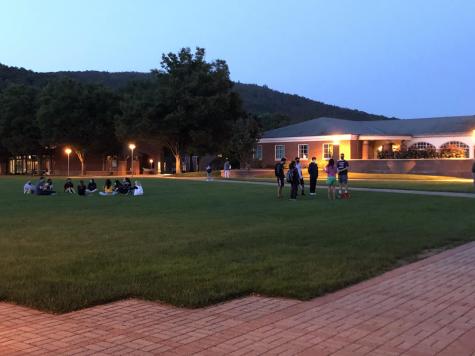Walking the walk
New chief experience officer, faculty and staff plan evenings to supervise residential areas
September 15, 2020
Tom Ellett, Quinnipiac University’s first chief experience officer, is looking for faculty and staff volunteers to walk the Mount Carmel residential areas to build relationships and encourage adherence to COVID-19 safety procedures.
Ellett invited all faculty and staff in an email Sept. 2, to use Sign Up Genius to register for time slots to walk around campus. The slots were every Thursday, Friday, Saturday and Sunday between 9-11 p.m.
“These walks are not only to engage students, but to look at social distancing, make sure masks are being worn,” Ellett said. “It is a reinforcement of our expectations to get us through the semester healthy and successfully as a community.”

While some professors have concerns about student privacy, others think a little extra surveillance is necessary during this time.
“I think it’s everyone’s job to make sure that we are all social distancing and wearing our masks,” said Aileen Dever, associate professor of Spanish. “It may be that someone doesn’t realize that they have their mask on their chin instead of covering their mouth so another student or a professor can gently point that out. Helping us all stay safe means staying on campus and proving how responsible and mature our students are.”
The walks started on Sept. 3. Each night has about two sign ups so far, ranging from professors, to associate deans to the provost, Debra Liebowitz. The sign-ups go through Oct. 10, and every day has at least one participant.
A statement from the Quinnipiac administrative team supports Ellett’s initiative as another way to support the “Pact” that all students signed before coming to campus, promising to follow COVID-19 procedures.
“Given the added precautions because of COVID-19 this fall, actively engaging with students and walking around campus is a way to both role model the right behaviors and enforce the policies in place for the fall,” said John Morgan, associate vice president for public relations, in a statement.
Students are unsure about whether this additional surveillance is necessary. Junior health science major Jamielyn Iquina said she would want some way to identify that those circulating residential areas are faculty or staff.
“If they wear a mask that can identify them as faculty or staff, it may make it less suspicious if they weren’t,” Iquina said. “A mask can easily disguise anyone that isn’t a student.”
Other students acknowledged the tendency of young people to stretch the regulations when no one is monitoring.
“I think some of the regulations go beyond science into paranoia, but people are way too irresponsible,” said Alex Overzat, senior history major.
Morgan said in his statement that these walks are part of demonstrating that everyone at Quinnipiac is committed to staying safe on campus.
“This ties directly to the language of ‘The Pact,’ which acknowledges the impact our actions have on each other and the role we each have in keeping our Quinnipiac community safe from the spread of COVID-19,” Morgan said. “I guess you can say we are literally walking the walk.”
At other universities, surveillance over students during COVID-19 is much more extreme. According to an article in The Atlantic, a small school in Michigan is requiring students to install an app that tracks their location. The University of Mississippi has an app that tracks when students come in and out of buildings.
The journalist from The Atlantic, Zeynep Tufekci, who did not respond to a request for a comment, argues in her article that this type of high-level surveillance will actually cause students to act out more.
“Knowing that they are being tracked, some students will no doubt let their phone ‘sleep’ peacefully in their bed while they party elsewhere,” Tufkekci wrote. “If a few get sick, they may hide it, for fear of having their tech trickery found out. This is an extra challenge with the college-student cohort because many of them either experience COVID-19 as a mild illness or are completely asymptomatic, but still seem to transmit the virus efficiently, unlike young children. Universities will likely be hindered in their crucial contact-tracing efforts as students will be inclined to lie.”
Quinnipiac’s app only prompts students to report symptoms, but overall administration is relying on students to make good decisions about where they go and how they spend their time. Having a group of faculty and staff walk around is just a part of enforcement, some students argue.
“These are policies we agree to adhere to by coming to QU, so their enforcement would be implied,” said Nicholas Ciampanelli, junior economics and political science double major.







